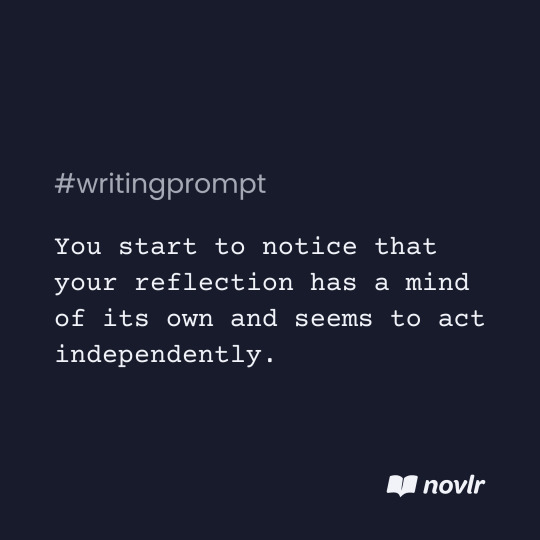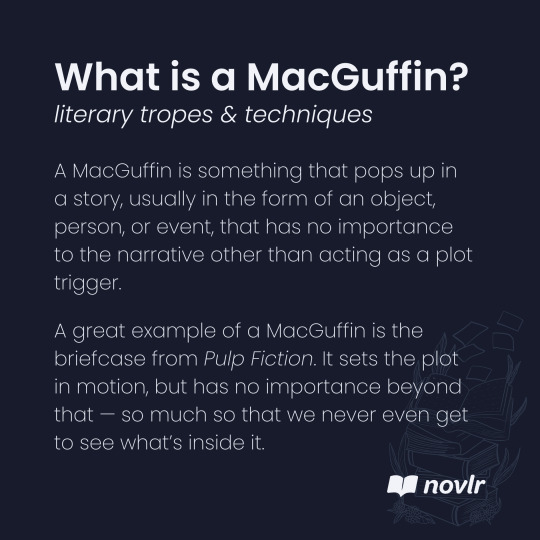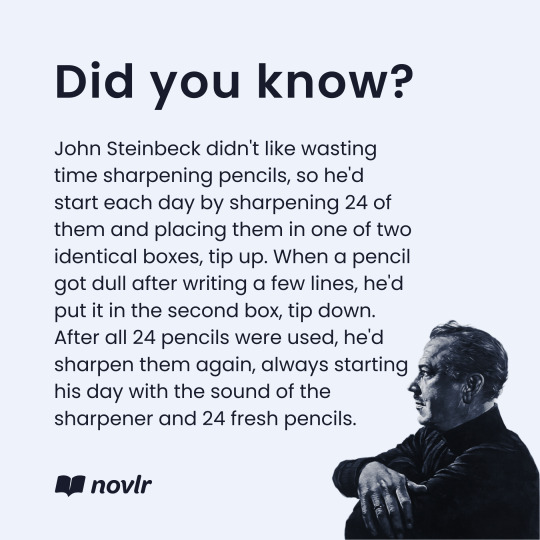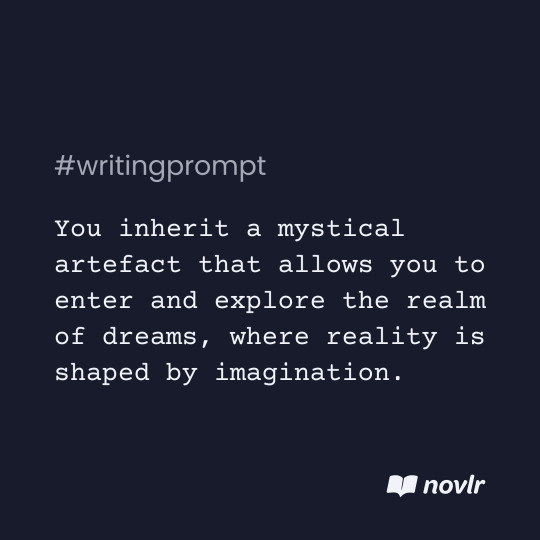Text
There should be a fanfic writing game called the showrunners challenge where someone writes a story and partway through someone else can play things like "actor leaves after 4000 more words" or "topic now too politically sensitive due to unforeseen world events" or "lost rights to that reference"
18K notes
·
View notes
Text
“One word after another. That’s the only way that novels get written.”
— Neil Gaiman
#neil gaiman#on writing#insp#author quotes#authors#writers#creative writing#writing#writing community#writers of tumblr#creative writers#writing inspiration#writeblr#writerblr#writing tips#author#writblr#writer stuff#writer things#writers cor#writers corner#wr#writers block#writers and poets#writing advice#writers on tumblr#block#beat writers block#inspi#creative inspiration
130 notes
·
View notes
Text

#writing prompt#writing prompts#idea#story ideas#ins#writing inspiration#writers#creative writing#writing#writing community#writers of tumblr#creative writers#writeblr#writerblr#writing tips#prom#story prompts#fic prompt#prompt#story prompt#writing ideas#story idea#writing idea#creative writing prompt#let's write#insp#story inspiration#creative inspiration#wri#writers block
23 notes
·
View notes
Note
What is a good way to start a novel? (sentence frames)
Are you a creative writer struggling to get started on your next project? Do you find yourself staring at a blank page, unsure of where to begin? Fear not! Here are some sentence frames designed to inspire your creativity and help you generate story ideas.
Get to know your main character
[Character name] was not your typical [profession/role]; in fact, they…
Despite being [adjective], [character name] had always felt…
[Character name] had a secret, one that they had kept hidden for [time period]…
As [character name] looked out the window, they couldn’t help but wonder what life would be like if…
[Character name] had always been drawn to [hobby/interest], but had never had the courage to pursue it until…
The day [character name] met [another character], everything changed…
Setting the scene
The town of [name] was known for its [unique characteristic], but beneath the surface…
In a world where [fantastical element] was commonplace, [character name] stood out because…
The [building/location] had stood abandoned for [time period], but on this particular night there was [an event]…
The [place/location] was famed for its [unique characteristic], but [character] found themselves drawn to [thing]…
Introduce conflict
[Character name] had always believed that [belief], until [event] forced them to question everything.
When [character name] discovered [secret/revelation], they knew they had to…
The arrival of [character/object] in [setting] threw [character name]’s life into chaos, as they…
[Character name] had always been content with their [status quo], but when [event] occurred, they realised that they could no longer ignore their true calling.
The arrival of [character name] in [place/location] set off a chain of events that would uncover long-buried secrets and force the [people of location] to confront their darkest demons.
Show character growth
[Character name] had spent their entire life [doing/believing something], but now they began to wonder if…
As [event] unfolded, [character name] realised that they were capable of…
[Character name] had always been afraid of [fear], but in the face of [challenge], they discovered…
[Character name] used to [old behaviour], but now they [new behaviour]…
As [character name] faced [challenge], they discovered a [new strength/quality] within themselves…
[Character name] never thought they could [achievement], but with [catalyst], they learned to [lesson]…
Create suspense and mystery
[Character name] knew that [mystery/secret] held the key to [goal], but the closer they got to the truth…
As [character name] delved deeper into [investigation/quest], they began to suspect that…
The [object/clue] seemed insignificant at first, but as [character name] examined it more closely, they saw [detail].
[Character name] had a nagging feeling that something was off about [person/place/thing], but couldn’t quite put their finger on it until [event].
The [sound/smell/sight] was hauntingly familiar to [character name], but they couldn’t remember why until [event].
Explore character relationships
[Character name] had always looked up to [other character], but now they began to see them in a different light because [event/change].
Despite their differences, [character name] and [other character] found themselves drawn to each other because of [detail].
[Character name] knew that [other character] was hiding something, but they never expected [revelation].
[Character name] and [other character] were once inseparable, but [change] meant they grew apart.
[Character name] never expected to find a friend in [other character], but [character detail/event/location] brought them together.
[Character name] couldn’t shake the feeling that [other character] was hiding [secret] from them.
Remember, these sentence frames are just a starting point to help you generate ideas and get your creative juices flowing. Feel free to adapt, combine, or expand upon them to suit your unique story and writing style. The most important thing is to let your imagination run wild and enjoy the process of writing your novel!
#writing prompts#writing ideas#story ideas#writing inspiration#sentence frames#writing resources#writers#creative writing#writing#writing community#writers of tumblr#creative writers#writeblr#writerblr#writing tips#writing advice#writers on tumblr#creative writing prompt#fic prompt#story prompt#writing prompt#story prompts#let's write#writing asks#writers and poets#writer community#writers block#writer#beat writers block#writer's block
213 notes
·
View notes
Text
#worldbuilding#fantasy worldbuilding#writers#creative writing#writing#writing community#writers of tumblr#creative writers#writing inspiration#writeblr#writerblr#writing tips#helping writers#writing science fiction#fantasy world building#writing fantasy#writing games#writing exercise#writing exercises#let's write#resources for writers#writers on tumblr#how to write#writers and poets#writer's block#beat writers block#writers block#story inspiration#writer#writing advice
59 notes
·
View notes
Text
Don't get stuck on a scene
Not in the mood to write the scene you’re working on? Don’t worry about it! Make some notes and move on.
There is no shame in just jotting down the main points in a scene and revisiting it later. It’s ok to just not be feeling it sometimes.
#writing tips#writers#creative writing#writing#writing community#writers of tumblr#creative writers#writing inspiration#writeblr#writerblr#tips for writers#helping writers#writing quick tips#quick writing tips#writing resources#writers on tumblr#writers and poets#writing advice#writer#writer community#writblr#writers corner#poets and writers#let's write#resources for writers#on writing#writer stuff
670 notes
·
View notes
Text

#macguffin#literary tropes#writers#creative writing#writing#writing community#writers of tumblr#creative writers#writing inspiration#writeblr#writerblr#writing tips#writing tropes#literary techniques#literary device#literary terms#let's write#helping writers#resources for writers#writers on tumblr#writer#writing advice#writing resources#writers and poets#writer community#writblr#writers corner#writing help#help for writers#how to write
71 notes
·
View notes
Note
Can you tell me the difference between a preface, and introduction, a foreword and a prologue? I never know which to use.
You're in luck! Today's blog post is all about that very topic.
Different genres will use them differently (for instance, there will be slight differences between how a non-fiction book uses a foreword, vs how a work of fiction uses a foreword), but in general, they all serve very distinct purposes, and readers will approach them differently.
You'll find the full post at the link below:
#preface#introduction#foreword#prologue#writing asks#writing tips#helping writers#how to write#writers#creative writing#writing#writing community#writers of tumblr#creative writers#writeblr#writerblr#writblr#writer stuff#writers on tumblr#writing help#tips for writers#let's write#learn to write#writer#writing advice#writing resources#writers and poets#resources for writers#writing reference#references for writers
48 notes
·
View notes
Text
“Write one good clean sentence and put a period at the end of it. Then write another one.”
— M. F. K. Fisher
#writers#mfk fisher#writer#creative writing#writing#writing community#writers of tumblr#creative writers#writing inspiration#writeblr#writerblr#writing tips#writing advice#writers on tumblr#authors#author#writers and poets#writer stuff#writers corner#poets and writers#writers life#on writing#writing motivation#writing stuff#author quotes#inspiring quotes
147 notes
·
View notes
Text

#writing prompt#story idea#writers#creative writing#writing#writing community#writers of tumblr#creative writers#writing inspiration#writeblr#writerblr#story prompts#fic prompt#story prompt#writing prompts#writing tips#writing idea#writing ideas#story ideas#let's write#story inspiration#creative inspiration#writer#writers on tumblr#beat writers block#writers block#writer's block#writers and poets#on writing#writing resources
88 notes
·
View notes
Note
how do i write an established married couple that are out of their honeymoon phase and now theyre just cute and comfy w/ eachother??
Established relationships, in particular, require careful consideration and development to make them feel authentic and relatable to your readers. An established relationship is one that has a history of shared experiences and a level of comfort and familiarity between the characters and can take many forms, such as long-term friendships, romantic partnerships, or even familial bonds. Writing established relationships requires a deep understanding of the characters’ backstories, the dynamics of their relationship, and how their connection influences their individual arcs.
Understand the dynamics of established relationships
Established relationships have a history and shared experiences that shape their current state.
Power dynamics, roles, and expectations within the relationship have been formed over time.
Established relationships involve a level of comfort, familiarity, and trust between the characters.
Conflicts and challenges in established relationships may be more complex and deeply rooted.
Characters in established relationships have a deeper understanding of each other’s strengths, weaknesses, and quirks.
Established relationships involve a sense of commitment, loyalty, or even obligation.
Develop their backstory
How and when did the characters first meet, and what were their initial impressions?
What significant events or experiences have the characters shared that have shaped their relationship?
How has the relationship evolved over time, and what challenges or conflicts have they faced together?
What are some of the defining moments or turning points in their relationship?
How has the way the characters have grown and changed as individuals affected their relationship?
What are some of the inside jokes, shared references, or traditions that are unique to their relationship?
Show the depth of their connection
Use dialogue to reveal the characters’ familiarity, comfort, and understanding of each other.
Show the characters engaging in shared activities or rituals that demonstrate their bond.
Describe the characters’ nonverbal communication, like knowing glances or subtle gestures.
Reveal the characters’ ability to anticipate each other’s needs, thoughts, or reactions.
Show the characters supporting, comforting, or challenging each other in meaningful ways.
Demonstrate the characters’ willingness to make sacrifices or compromises for the sake of their relationship.
Explore conflicts and challenges
Identify the underlying tensions, differences, or unresolved issues in the relationship.
Show how the characters navigate and cope with these challenges, both individually and as a pair.
Explore how external factors, such as family, work, or personal goals, can strain the relationship.
Demonstrate how the characters’ individual flaws or weaknesses can affect the relationship.
Show the characters working through conflicts, compromising, or finding solutions together.
Illustrate how the challenges and conflicts ultimately strengthen or change the relationship.
Develop character arcs
Show how the relationship influences each character’s personal growth, decisions, and actions.
Explore how the characters’ individual journeys affect the dynamics of the relationship.
Show how the characters learn from each other and inspire growth or change.
Show how the relationship evolves because of the characters’ individual development.
Illustrate how the characters’ shared experiences and challenges shape their shared future.
Reveal how the relationship ultimately supports or hinders the characters’ individual goals and desires.
Craft authentic dialogue and interactions
Use inside jokes, nicknames, or references that are specific to the relationship.
Show the characters finishing each other’s sentences or thoughts, demonstrating their deep understanding of the other.
Use subtext and implication in dialogue to reveal the characters’ unspoken feelings or concerns.
Demonstrate the characters’ ability to communicate effectively, even during conflicts or disagreements.
Show the characters engaging in playful banter or teasing that reflect their comfort with each other.
Illustrate the characters’ ability to have meaningful, vulnerable conversations that deepen their connection.
#writers#creative writing#writing#writing community#writers of tumblr#creative writers#writing inspiration#writeblr#writerblr#writing tips#writblr#writing relationships#writer#writing advice#writing resources#writers on tumblr#let's write#helping writers#resources for writers#writers and poets#help for writers#writing help#tips for writers#on writing#writing stuff#writing blog#quick writing tips#how to write#advice for authors#writing reference
102 notes
·
View notes
Note
I've recently moved from the city to the country with my family and want to write a memoirs based on my experiences with nature. Do you have any tips on nature writing? I don't want to write fiction, but i'm not sure how to make non-fiction interesting.
We've actually got a great series of resources in the Reading Room on all types of non-fiction writing, created for us by a commissioning editor from Penguin Random House! Here's the one specifically on nature writing:
The entire series is well worth reading, and she also created a completely free non-fiction book proposal course for us too, which will teach you what a book proposal needs to include for you to best pitch to publishers.
#writing non fiction#nature writing#non fiction books#writers#creative writing#writing#writing community#writers of tumblr#creative writers#writing inspiration#writeblr#writerblr#writing tips#writblr#writer stuff#writers on tumblr#writers corner#helping writers#writing courses#help for writers#tips for writers#how to write#learn to write#writer#writing advice#writing resources#writers and poets#resources for writers#writing stuff#on writing
19 notes
·
View notes
Text
Save formatting for last
Try to avoid formatting while you’re drafting — it’s a distraction.
Your first draft will never look the same as your final one, so formatting takes you away from the important business of writing. For many writers, it’s the reason they struggle to get words on the page.
#writing tips#writers#creative writing#writing#writing community#writers of tumblr#creative writers#writing inspiration#writeblr#writerblr#writblr#writers corner#tips for writers#helping writers#help for writers#let's write#writer#writers on tumblr#writing advice#writing resources#writers and poets#how to write#author#writer stuff#writing stuff#on writing#writing help#writing tips and tricks#book formatting#writers life
90 notes
·
View notes
Text

#john steinbeck#did you know#fun facts#writers#creative writing#writing#writing community#writers of tumblr#creative writers#writing inspiration#authors#author#writer#writers on tumblr#writers and poets#writer stuff#on writing#writing stuff
38 notes
·
View notes
Note
How do I write historical fiction? I have an idea for my story but I'm not sure that my characters feel "historical" if that makes sense?
Writing historical fiction takes some thought. One of the reasons you might not feel that your characters feel "historical," is because you've picked the wrong time period for the type of story you want to tell.
Take a moment to think about your story's themes and core message. What do you want readers to take away from your book? With that in mind, does the period you chose fit that intention? Maybe you need to choose a time in modern history. Maybe you need to go back further. Maybe you need to choose a social and cultural setting that will better highlight what you want to say.
We've got a comprehensive guide to historical fiction available in the Reading Room which might help you get started:
#historical fiction#writing asks#writing blog#writers#creative writing#writing#writing community#writers of tumblr#creative writers#writing inspiration#writeblr#writerblr#writing tips#writblr#writers corner#writers on tumblr#poets and writers#writers life#let's write#resources for writers#helping writers#tips for writers#writing advice#writer#writing resources#writers and poets#fiction#writing stuff#on writing#writer stuff
56 notes
·
View notes
Text
“A story is not a vignette. It has a beginning, middle and an end. It is not merely a snapshot in time.”
— Chuck Wendig
#chuck wendig#author quotes#writers#creative writing#writing#writing community#writers of tumblr#creative writers#writing inspiration#writeblr#writerblr#writing tips#literature#writing advice#writers on tumblr#author#writer#writers and poets#on writing#writers corner#writing stuff#let's write#helping writers
22 notes
·
View notes
Text

#writing prompt#writers#creative writing#writing#writing community#writers of tumblr#creative writers#writing inspiration#writeblr#writerblr#fic prompt#story prompt#writing prompts#story prompts#writing ideas#let's write#writers on tumblr#story inspiration#writers block#writers and poets#writing resources#writer's block#beat writers block#writer#writing stuff#writers corner#writers life#creative inspiration
58 notes
·
View notes